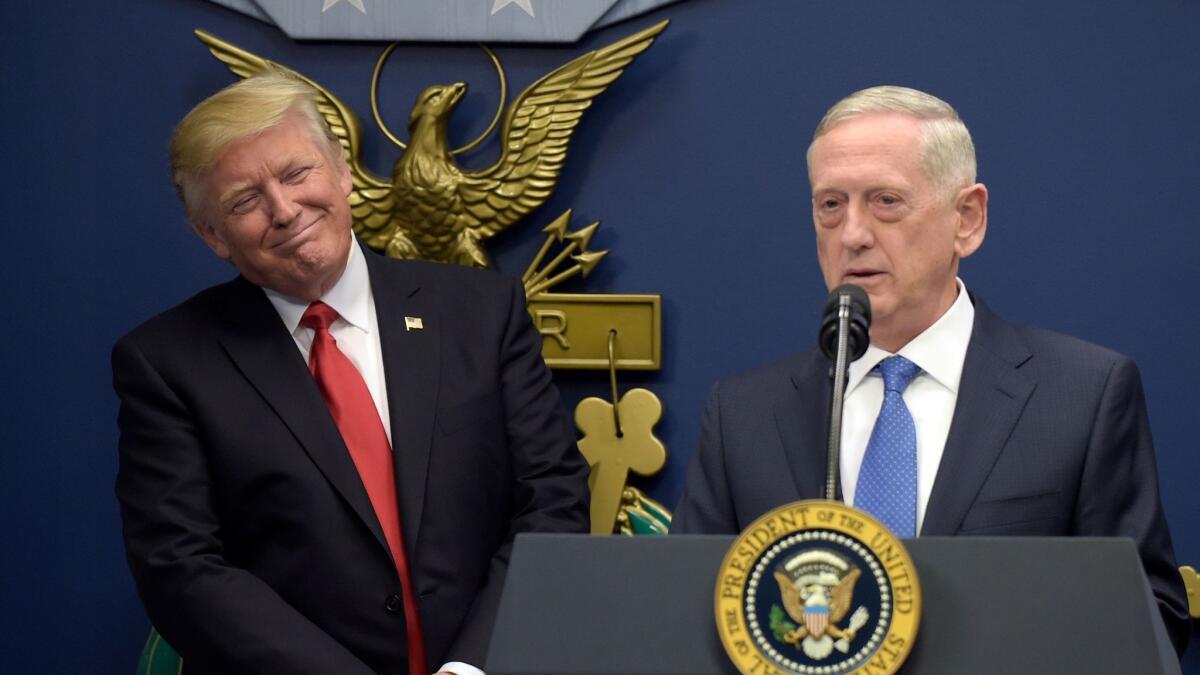Op-Ed: If ‘we don’t win anymore,’ why does Trump keep promoting generals?

- Share via
Here’s another Trump era head-scratcher: At the same time the president is urging a $54-billion increase in military expenditure because “we don’t win anymore,” he is giving ever-greater power to generals responsible for our military failures since the Sept. 11 attacks.
Before the 21st century, it was winning generals who transformed their military triumphs into political power. Think of George Washington, Andrew Jackson, Ulysses Grant and Dwight Eisenhower. In contrast, the generals who lost the Vietnam War receded into obscurity.
Yet a new dynamic emerged in the wake of President Bush’s failed “shock and awe” campaigns in Afghanistan and Iraq. As the extent of these debacles became clear, the president was determined to avoid the fate of Richard Nixon, who saw our forces humiliated in Vietnam on his watch. Bush aimed instead to defer the day of reckoning to his successor, and so encouraged his leading generals to convince the public that it made sense to continue the wars over the middle run.
Trump laments that ‘we don’t fight to win.’ Yet in Trump’s parlance, he’s put the losers in charge.
On Sept. 11, 2007, as the nation recalled the World Trade Center tragedy, Bush handed the spotlight to his new commanding general, David Petraeus, who urged the Armed Services Committee to support the administration’s “surge” in Iraq. With troop levels reaching 150,000, Petraeus restored stability, allowing Bush a graceful exit from the White House. Nevertheless, the massive destruction wrought by the surge greatly increased Iraqi alienation from the corrupt and authoritarian government in Baghdad — making the fundamentalist appeal of Islamic State seem attractive to some by comparison.
President Obama copied Bush’s strategy when confronting a similar crisis in Afghanistan. After the government in Kabul lost control of much of the countryside, Obama again appointed Petraeus to lead a second “surge” — generating the same pattern of short-term success and long-term failure.
Apparently short-term is good enough: It’s been widely reported that Trump may give Petraeus a role in his administration.
But perhaps it’s unfair to blame Petraeus for our precarious position in Afghanistan today; perhaps we should look to whoever was head of Central Command when he was surging there. That would be Gen. James Mattis, now our Defense secretary, who was also in charge as the Arab Spring descended into chaos. Although his colleagues may hold Mattis in high regard, it is clear that his strategies failed to yield peace.
Since Mattis retired only three years ago, the president had to persuade Congress to exempt him from the statutory provision requiring secretaries of Defense to spend at least seven years in civilian life before taking office. Trump’s Defense department, then, will be a place where a general of recent vintage talks to his former comrades about the best way to fine-tune the strategies he helped develop, and which so far have not succeeded. There will be no independent perspective, no critical eye to lead the military in new directions.
Gen. H.R. McMaster’s appointment to head of the National Security Council compounds the problem. McMaster, who served in Iraq and Afghanistan, advanced a provocative thesis in his book “Dereliction of Duty.” He argued that commanding generals during the Vietnam War were wrong to subordinate themselves to the diplomatic maneuverings of leaders like Henry Kissinger. Instead, they should have demanded that civilian grand strategists defer to their military expertise.
In short, McMaster’s ascent marks the victory of a self-declared enemy of civilian control — at the moment when the secretary of Defense, who also serves on the National Security Council, is a military man as well.
These two generals will be joined on the NSC by former Gen. General John Kelly, secretary of Homeland Security, who retired only a couple of years ago — and is another avowed enemy of civilian control.
As he said in a 2014 speech: “If you think this war against our way of life is over because some of the self-appointed opinion-makers and chattering class grow ‘war weary,’ because they want to be out of Iraq or Afghanistan, you are mistaken. This enemy is dedicated to our destruction. He will fight us for generations, and the conflict will move through various phases as it has since 9/11.” Serious military men, it appears, must learn to ignore the “self-appointed opinion-makers” in the political arena as they steel themselves for a multi-generational struggle against an amorphous “enemy.”
Trump laments that “we don’t fight to win.” Yet in Trump’s parlance, he’s put the losers in charge. If personnel is policy, we’re in for endless, fruitless combat. The NSC will squander the Pentagon’s new riches in elaborate efforts to fine-tune strategies that have proved incapable of sustaining stable government, let alone human freedom, since Sept. 11.
There’s a way out, and that’s to deny Trump his billions and repudiate his blind trust in military commanders. Lawmakers should seize the first opportunity to return the conduct of foreign policy to civilian leaders who understand America’s mission in more capacious terms.
Bruce Ackerman is a professor of law and political science at Yale, and the author of “The Decline and Fall of the American Republic.”
Follow the Opinion section on Twitter @latimesopinion or Facebook
A cure for the common opinion
Get thought-provoking perspectives with our weekly newsletter.
You may occasionally receive promotional content from the Los Angeles Times.






